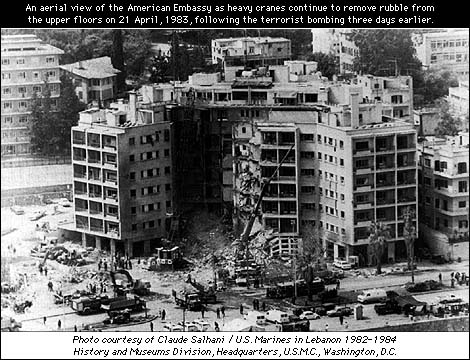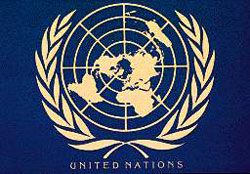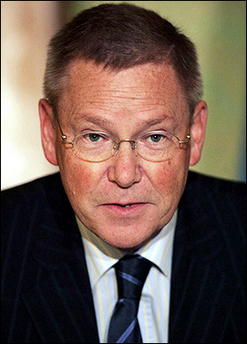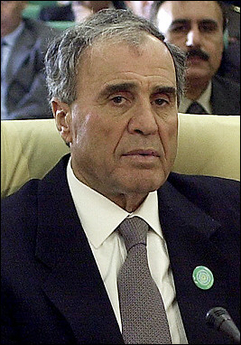 By CLAUDE SALHANI UPI International Editor WASHINGTON, Oct. 19 (UPI) — Quite unlike the invasion of Iraq, the U.S. Marines in Lebanon came in peace — and at the request of the Lebanese government. This Sunday, Oct. 23, will mark the 22nd anniversary of the bombing of the Marine barracks in Beirut where 241 U.S. servicemen, mostly Marines, lost their lives. At approximately 6:22 a.m. on Sunday, Oct. 23, 1983, a lone terrorist driving a yellow Mercedes-Benz stake-bed truck loaded with explosives accelerated through the public parking lot south of the 24th Marine Amphibious Unit Battalion Landing Team headquarters building, detonating about 12,000 pounds of hexogen. According to the official Department of Defense commission report, the force of the explosion ripped the building from its foundation. The building then imploded upon itself and almost all of the occupants were crushed or trapped inside the wreckage.
By CLAUDE SALHANI UPI International Editor WASHINGTON, Oct. 19 (UPI) — Quite unlike the invasion of Iraq, the U.S. Marines in Lebanon came in peace — and at the request of the Lebanese government. This Sunday, Oct. 23, will mark the 22nd anniversary of the bombing of the Marine barracks in Beirut where 241 U.S. servicemen, mostly Marines, lost their lives. At approximately 6:22 a.m. on Sunday, Oct. 23, 1983, a lone terrorist driving a yellow Mercedes-Benz stake-bed truck loaded with explosives accelerated through the public parking lot south of the 24th Marine Amphibious Unit Battalion Landing Team headquarters building, detonating about 12,000 pounds of hexogen. According to the official Department of Defense commission report, the force of the explosion ripped the building from its foundation. The building then imploded upon itself and almost all of the occupants were crushed or trapped inside the wreckage.
"It was one of the largest noises I’ve ever heard in my entire career," said retired Marine Maj. Robert T. Jordan, the 24th MAU public affairs officer at the time of the bombing. Jordan was in his rack in an adjacent building when the explosion split the still morning air and showered him with glass and pulverized concrete. It was also the heaviest loss the Marine Corps suffered in any single day since the battle of Iwo Jima during World War II. A few moments later another suicide bomber rammed his truck into the "Drakkar," a building occupied by French paratroopers. Fifty-eight French soldiers perished in this attack. The Marines, the French, the Italian and the Brits had come in peace — to help secure peace in Lebanon.
 THE United States and France plan to introduce two UN resolutions next week aimed at holding Syria to account for meddling in Lebanon and for its alleged links to the assassination of former Lebanese prime minister Rafiq Hariri.The moves
THE United States and France plan to introduce two UN resolutions next week aimed at holding Syria to account for meddling in Lebanon and for its alleged links to the assassination of former Lebanese prime minister Rafiq Hariri.The moves  By Nadim Ladki BEIRUT (Reuters) – The leaders of Syria and Lebanon could be fighting for political survival if, as many expect, a U.N. inquiry blames Syrian and pro-Syrian Lebanese officials for the killing of Lebanese former Prime Minister Rafik al-Hariri. Analysts and diplomats say they expect a cycle of bombings and killings to continue or intensify in Lebanon, where Syrian influence remains strong and where pro-Syrians will challenge any such U.N. findings as politically motivated. Chief U.N. investigator Detlev Mehlis presents his report to Secretary-General Kofi Annan on Friday over the February 14 assassination of Hariri and 20 others in a truck bomb in Beirut.Diplomats and Lebanese political sources have told Reuters they expect Mehlis to name some Syrian officials in his report, as well as several pro-Syrian Lebanese officials and others.It was not clear whether the suspects would include members of Syrian President Bashar al-Assad’s inner circle.
By Nadim Ladki BEIRUT (Reuters) – The leaders of Syria and Lebanon could be fighting for political survival if, as many expect, a U.N. inquiry blames Syrian and pro-Syrian Lebanese officials for the killing of Lebanese former Prime Minister Rafik al-Hariri. Analysts and diplomats say they expect a cycle of bombings and killings to continue or intensify in Lebanon, where Syrian influence remains strong and where pro-Syrians will challenge any such U.N. findings as politically motivated. Chief U.N. investigator Detlev Mehlis presents his report to Secretary-General Kofi Annan on Friday over the February 14 assassination of Hariri and 20 others in a truck bomb in Beirut.Diplomats and Lebanese political sources have told Reuters they expect Mehlis to name some Syrian officials in his report, as well as several pro-Syrian Lebanese officials and others.It was not clear whether the suspects would include members of Syrian President Bashar al-Assad’s inner circle. BEIRUT, 13 October (IRIN) – People who know they are HIV positive in Lebanon keep very quiet about the matter to avoid becoming social outcasts. AIDS is taboo. Anyone suspected of having the disease risks total rejection by their friends, family and colleagues at work. Sara, a 40-year-old office worker in Beirut, knows all about that.
BEIRUT, 13 October (IRIN) – People who know they are HIV positive in Lebanon keep very quiet about the matter to avoid becoming social outcasts. AIDS is taboo. Anyone suspected of having the disease risks total rejection by their friends, family and colleagues at work. Sara, a 40-year-old office worker in Beirut, knows all about that.  Oct 12 (Reuters) – Syrian Interior Minister Ghazi Kanaan, said by Syria’s state news agency to have committed suicide on Wednesday, long served as the top enforcer of his country’s policies in Lebanon. Kanaan was interviewed last month by a U.N. team probing the Feb. 14 assassination of former Lebanese Prime Minister Rafik al-Hariri. Chief U.N. investigator Detlev Mehlis is expected to submit his report to Secretary-General Kofi Annan on Oct. 21.
Oct 12 (Reuters) – Syrian Interior Minister Ghazi Kanaan, said by Syria’s state news agency to have committed suicide on Wednesday, long served as the top enforcer of his country’s policies in Lebanon. Kanaan was interviewed last month by a U.N. team probing the Feb. 14 assassination of former Lebanese Prime Minister Rafik al-Hariri. Chief U.N. investigator Detlev Mehlis is expected to submit his report to Secretary-General Kofi Annan on Oct. 21.  A1 Team Lebanon was out on track for qualifying today at the A1 Grand Prix of Nations EuroSpeedway. The demands of a new car and new engine required the team to devote track time to the technical demands from Zytek, with regard to the engine, and Lola for the chassis. This focus was reflected in the final qualifying times with Khalil Beschir lining up 24th on the grid.A1 Team Lebanon started the EuroSpeedway race weekend with a new A1 racing car, following Beschir’s accident during the Feature race at Brands Hatch, England. The new car required a series of technical procedures to be completed during the practice sessions and the team devoted most of its track time in free practice concentrating on these. Khalil Beschir drove the car in first practice and with the limited time available for car setup, A1 Team Lebanon elected to optimize this with Beschir continuing to drive throughout the weekend. Team mate, Basil Shaaban, on hand at EuroSpeedway took the opportunity to join the Al Jazeera commentary team for the qualifying session adding a driver perspective for television viewers in the Arab world. The A1 Grand Prix qualifying format requires drivers to make four flying laps, within four 15 minute qualifying segments, with the best two times aggregated to produce the overall qualifying position. A1 Team Lebanon posted four good lap times, improving with each run, and with Beschir’s aggregate time less than three seconds off the pole sitter.
A1 Team Lebanon was out on track for qualifying today at the A1 Grand Prix of Nations EuroSpeedway. The demands of a new car and new engine required the team to devote track time to the technical demands from Zytek, with regard to the engine, and Lola for the chassis. This focus was reflected in the final qualifying times with Khalil Beschir lining up 24th on the grid.A1 Team Lebanon started the EuroSpeedway race weekend with a new A1 racing car, following Beschir’s accident during the Feature race at Brands Hatch, England. The new car required a series of technical procedures to be completed during the practice sessions and the team devoted most of its track time in free practice concentrating on these. Khalil Beschir drove the car in first practice and with the limited time available for car setup, A1 Team Lebanon elected to optimize this with Beschir continuing to drive throughout the weekend. Team mate, Basil Shaaban, on hand at EuroSpeedway took the opportunity to join the Al Jazeera commentary team for the qualifying session adding a driver perspective for television viewers in the Arab world. The A1 Grand Prix qualifying format requires drivers to make four flying laps, within four 15 minute qualifying segments, with the best two times aggregated to produce the overall qualifying position. A1 Team Lebanon posted four good lap times, improving with each run, and with Beschir’s aggregate time less than three seconds off the pole sitter.  BEIRUT, Lebanon (UPI)– Lebanese Prime Minister Fouad Siniora Saturday launched a dialogue with the Palestinian groups in his country to ease rising tension between the two sides. Siniora met with a delegation representing the Palestine Liberation Organization before holding talks with representatives of various pro-Syrian factions in Lebanon. The talks came following tension between the two sides after the Popular Front for the Liberation of Palestine – General Command accused the Lebanese authorities of "tightening the grip" around its bases outside the 12 Palestinian refugee camps.
BEIRUT, Lebanon (UPI)– Lebanese Prime Minister Fouad Siniora Saturday launched a dialogue with the Palestinian groups in his country to ease rising tension between the two sides. Siniora met with a delegation representing the Palestine Liberation Organization before holding talks with representatives of various pro-Syrian factions in Lebanon. The talks came following tension between the two sides after the Popular Front for the Liberation of Palestine – General Command accused the Lebanese authorities of "tightening the grip" around its bases outside the 12 Palestinian refugee camps. 


